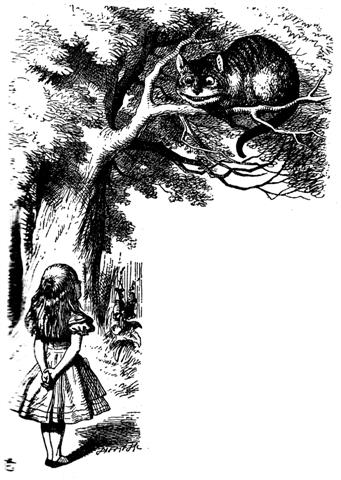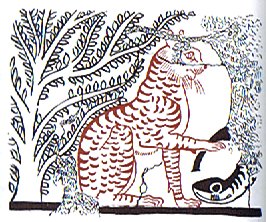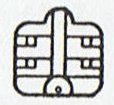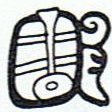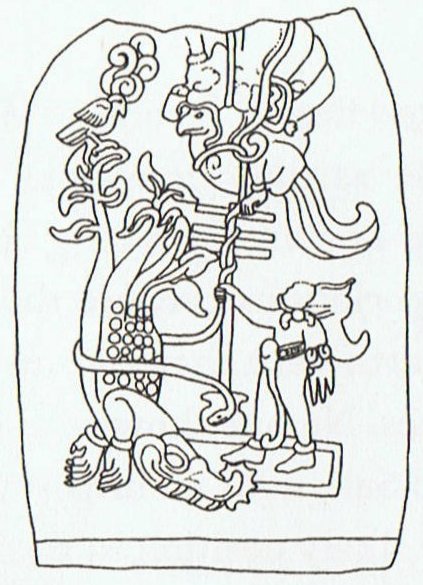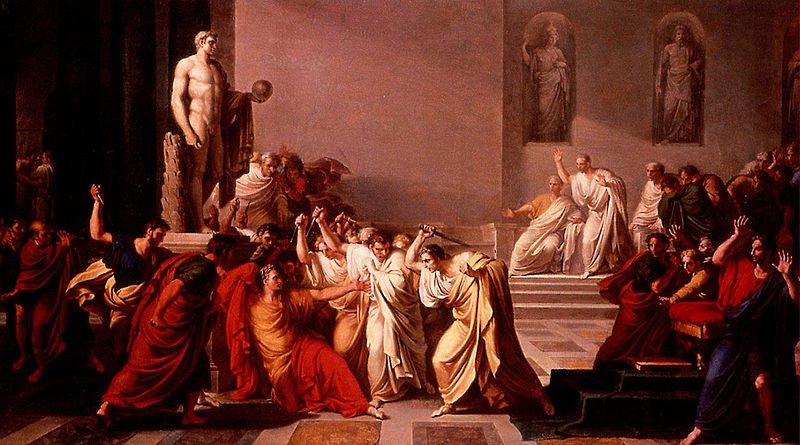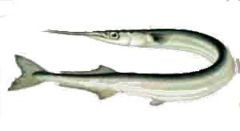The Head up in the Tree clearly was the Old One, now a coco nut:  ... When viewed on end, the endocarp and germination pores give the fruit the appearance of a coco (also Côca), a Portuguese word for a scary witch from Portuguese folklore, that used to be represented as a carved vegetable lantern, hence the name of the fruit. The specific name nucifera is Latin for nut-bearing ... ... Up to the present time, fertility spells for fowls have played an important role. Especially effective were the so-called 'chicken skulls' (puoko moa) - that is, the skulls of dead chiefs, often marked by incisions, that were considered a source of mana. Their task is explained as follows: 'The skulls of the chiefs are for the chicken, so that thousands may be born' (te puoko ariki mo te moa, mo topa o te piere) ... As long as the source of mana is kept in the house, the hens are impregnated (he rei te moa i te uha), they lay eggs (he ne'ine'i te uha i te mamari), and the chicks are hatched (he topa te maanga). After a period of time, the beneficial skull has to be removed, because otherwise the hens become exhausted from laying eggs ... When comparing words the 'season of Nuci-fera' should be contrasted with the 'season of Luci-fer', the Light-bringer. Alice has her hands behind her back and the Cheshire Cat looks highly alive - it was the season of the Light-bringer. Maybe the Polynesian niu is like the Tree in Leaf (Light) at the Egyptian miu (cat):
Both of them can then be contrasted with the Mayan 'Skeleton Tree' (of the Kan-kin month) which is completely bare, like a shaven head:
It is also possible to speculate around the Roman myths and such names as Junius = the month of Jupiter, i.e. Father-Light (Jus-Piter), which resembles an imaginary Jus-Niu ('Tree of Light'): ... While Tarquin was thus employed (on certain defensive measures), a dreadful prodigy appeared to him, a snake sliding out of a wooden pillar, terrified the beholders, and made them fly into the palace; and not only struck the king himself with sudden terror, but filled his breast with anxious apprehensions: so that, whereas in the case of public prodigies the Etrurian soothsayers only were applied to, being thoroughly frightened at this domestic aparition, as it were, he resolved to send to Delphi, the most celebrated oracle in the world; and judging it unsafe to entrust the answers of the oracle to any other person, he sent his two sons into Greece, through lands unknown at that time, and seas still more unknown. Titus and Aruns set out, and, as a companion, there was sent with them Junius Brutus, son to Tarquinia, the king's sister, a young man of a capacity widely different from the assumed appearance he had put on. Having heard that the principal men in the state, and among the rest his brother, had been put to death by his uncle, he resolved that the king should find nothing in his capacity which he need dread, nor in his fortune which he need covet; and he determined to find security in contempt since in justice there was no protection. He took care, therefore, to fashion his behaviour to the resemblance of foolishness, and submitted himself and his portion to the king's rapacity. Nor did he show any dislike of the surname Brutus, content that, under the cover of that appellation, the genius wich was to be the deliverer of the Roman people should lie concealed, and wait the proper season for exertion ... He was, at this time, carried to Delphi by the Tarquinii, rather as a subject of sport than as a companion; and is said to have brought, as an offering to Apollo, a golden wand inclosed in a staff of cornel wood, hollowed for the purpose, an emblem figurative of the state of his own capacity. When they were there, and had executed their father's commission, the young men felt a wish to enquire to which of them the kingdom of Rome was to come; and we are told that these words were uttered from the bottom of the cave - 'Young men, whichever of you shall first kiss your mother, he shall possess the sovereign power at Rome' ... Brutus judged that the expression of Apollo had another meaning, and as if he had accidentally stumbled and fallen, he touched the earth with his lips, considering that she was the common mother of all mankind ... ... I had decided to look up in what month Caesar was stabbed by Brutus, it just couldn't be July, I thought. My intuition said it should be at the other end of the single-cycle year, at the close of the year. Caesar represents human order and Brutus the 'brutal' chaotic forces which are so strong in spring. I was too lazy to search for Gibbons. Instead a quick look in Wikipedia was immediately rewarding. He was killed in the 'ides of March' (= March 15). And of course, Brutus was not alone - he had a bunch of companion brutes:
This is no longer my intuition working, it is my conscious mind following the map created from experience gained by walking in the mythic landscape. It couldn't be any other time than at the end of one rule, and being the rule of Rome, the great civilization, it couldn't be the time when the spring serpent is beheaded. I do not care if Wikipedia tells the 'true' (historical) story or if it has been manipulated over time. I do not care about the tunnel-eyed singleminded cause-and-effect superficial beliefs - I am interested in the deeper fundamental structure that is man. The structure which changes histories into myths. It is anyhow quite astonishing how in the tumult (turning over, toppling) of Caesar the stabbing knife at the beginning of a new year has its parallel in how Captain Cook was murdered in the tumult on Hawaii at the same time (in the mythic frame):
The brutes of spring caused the downfall of both Captain Cook and Julius Caesar. 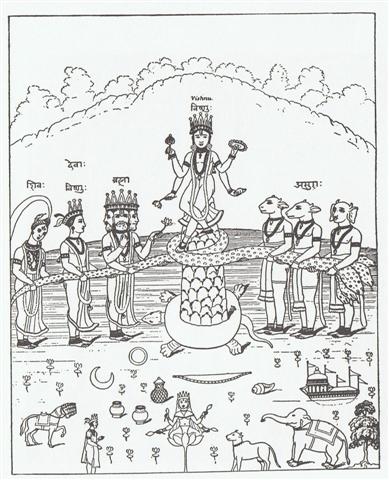 We are close to the key myth of mankind, that which explains the regeneration of sun and of growth. Once at least some people kept the tradition living. I became interested in what really happened at March 15 and reopened Henrikson to find out. Caesar was forewarned of the threat by the prophet Spurinna, who told him that a great threat was coming at Idus Martiae or just before. The day arrived and Caesar was still living, walking to his meeting with the Senate when he happened to encounter Spurinna and told him jokingly that he was still alive. Spurinna calmely answered that the day had yet not ended. The Romans divided their months in two parts and the dividing point was Idus, which in some way was connected with full moon. March 15 was the midpoint of March, which is close to spring equinox. The old agricultural year defined the beginning of the year to the time when sun returned, and it was connected with Mars. The light-bringer Lucifer fell down from heaven. Or he robbed the fire and quickly rushed down with it to the earth to evade his pursuers. There is no manu rere at Mars. This interpretation of the key events leading to the reappearance of light each year - a myth rehearsed annually by nature and man in cooperation - can be read (between the lines of course) also in Henrikson: The chaotic tumult in the Curia (where the Senate had their meeting and where they killed Caesar) resulted in his dead body left lying on the floor, while all the Senators panicked and ran out through the doors in different directions. They had planned to throw his body into the river, but the time of plans and order was in the past. Instead, in the afternoon, three of the slaves of Caesar came and fetched his body, and carried him on a stretcher to his home south of Forum - and one arm was hanging down in the corner where the 4th slave should have been. The hand of the dead Caesar was hanging down to earth. He was a sun king (according to myth) and the sun king follows the path of the sun. The sun takes on different shapes (habits) depending on season (house). At the end of the year he is an old man, at the beginning he is a little child. Sun comes again after having died at the limit of the old year. In the agricultural year it means at spring equinox (or shortly before). His downfall is necessary for the regeneration. The last quarter must end in a downfall ... The remains of the dead Captain Cook were later returned to the Europeans - but significantly not his head and not his hands. Both he and Caesar had been stabbed by a knife from behind. A knife is a harvest instrument.
|
